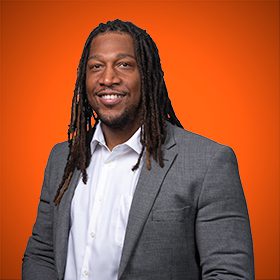Larry (Leo) Davis is a PhD / MBA graduate student in social work and social entrepreneurship at the School of Social Work & Quinlan School of Business at the Loyola University Chicago. He is a member of Health Policy Research Scholars Cohort 2022.
Tell us a little bit about yourself and what your research interests are.
I am a father, first generation graduate student and foster care alum. My research seeks to analyze and understand the nexus of Black fatherhood engagement (attachment) with child, and its effects on recidivism reduction, depression level, social engagement and self-esteem improvement among formerly incarcerated (Black) fathers and their children. I am interested in understanding how vicarious trauma due to mass incarceration impedes on healthy youth/ adolescent development and overall community mental health and stability.
What’s the story behind why you’re doing what you’re doing?
Lived experience with foster care and the separation from both of my biological parents. In addition to overcoming this adversity, I want to better understand how to correct this inequality, after witnessing my own daughter suffer (i.e., self esteem, disruptive behavior, trauma, interrupted relationships and lose of identity) due to my wrongful incarceration. I want to support families (fathers) who happen to experience the mass carceral system and provide support, education and training; so fathers can maintain relationships with their children without having fractured relationships. Ultimately improving mental health, decreasing depression and reducing recidivism rates.
Tell us about a project you are currently working on that you are excited about.
I’m excited to be providing a voice to those populations of fathers who are often left out of conversation. I’m also excited about changing the narrative and teaching other fathers how they can still be involved to care, love and support their child’s development; despite the adversity or circumstances they may face post-incarceration.
For people unfamiliar with your research area, what is one piece of information you think is important for them to know?
Father engagement with their children gives a sense of pride, purpose and dignity to formerly incarcerated persons. This can be a deterrent for recidivism and can ultimately help improve not only the fathers situation (mental health), but the child (identity) and the larger community context of safety and stability.
Who is a researcher you admire and why?
William Julius Wilson: I appreciate his research on deindustrialization and how economics and employment factors into the underlying context and current status or conditions of the urban context.
How do you think HPRS will complement your doctoral training?
The mentorship, resources and connections will help refine and take my research agenda to another level, that I do not think I could do on my own. Sometimes, its not about how much you know about an issue, but more so who can you get in front of to raise awareness to the issue. The connections that HPRS maintains will help place me in the right atmosphere where my voice can be heard.
What part(s) of HPRS excite you the most?
The ability to grow and contribute in a time of national history for social justice, equity and the fight for Black lives.
In the RWJF HPRS program we will work with you to help you think further about using your research to develop policy. If you could use your research to change any policy, what policy would it be?
Family Connection Policy: Where folks incarcerated are supported by programming (i.e. education, visitation, reading, relationship building, etc.) to stay connected with their children.
(Incarcerated) Family First Policy: Families experiencing incarceration are provided with the needed resources and time to help sustain and foster strong relationships between incarcerated parent and child; outside a correctional space (i.e., online format).
Family ReEntry Policy: Returning citizens are provided with community supports and resources for parenting, couching, mental health support and more. DOC’s are required to have parental engagement as part of the reentry planning process. Meaning those returning citizens are supported in the development of healthy relationships with their children. DOC funded programming. Families are provided with mental health resources (group counseling or CBT) to help restore and foster stronger relationships among fathers and child post incarceration.
Carceral System Accountability Act: DOC’s are responsible for creating reentry plans while connecting community resources and fathers (families) together prior to reentry. Programming that offers fathers space to actively engage on a format with the children (i.e., tutoring, reading and social engagement). Every parent (father) involved with the mass carceral system are provided with these resources.
Here’s a fun question to wrap things up. If you could visit any place in the world, where would you choose to go and why?
I would want to visit Hawaii. Simply put, I have never been to an island and would just like to dig my feet in some sand and take it all in. Food, weather and relaxation is needed. A perfect get away vacation.

